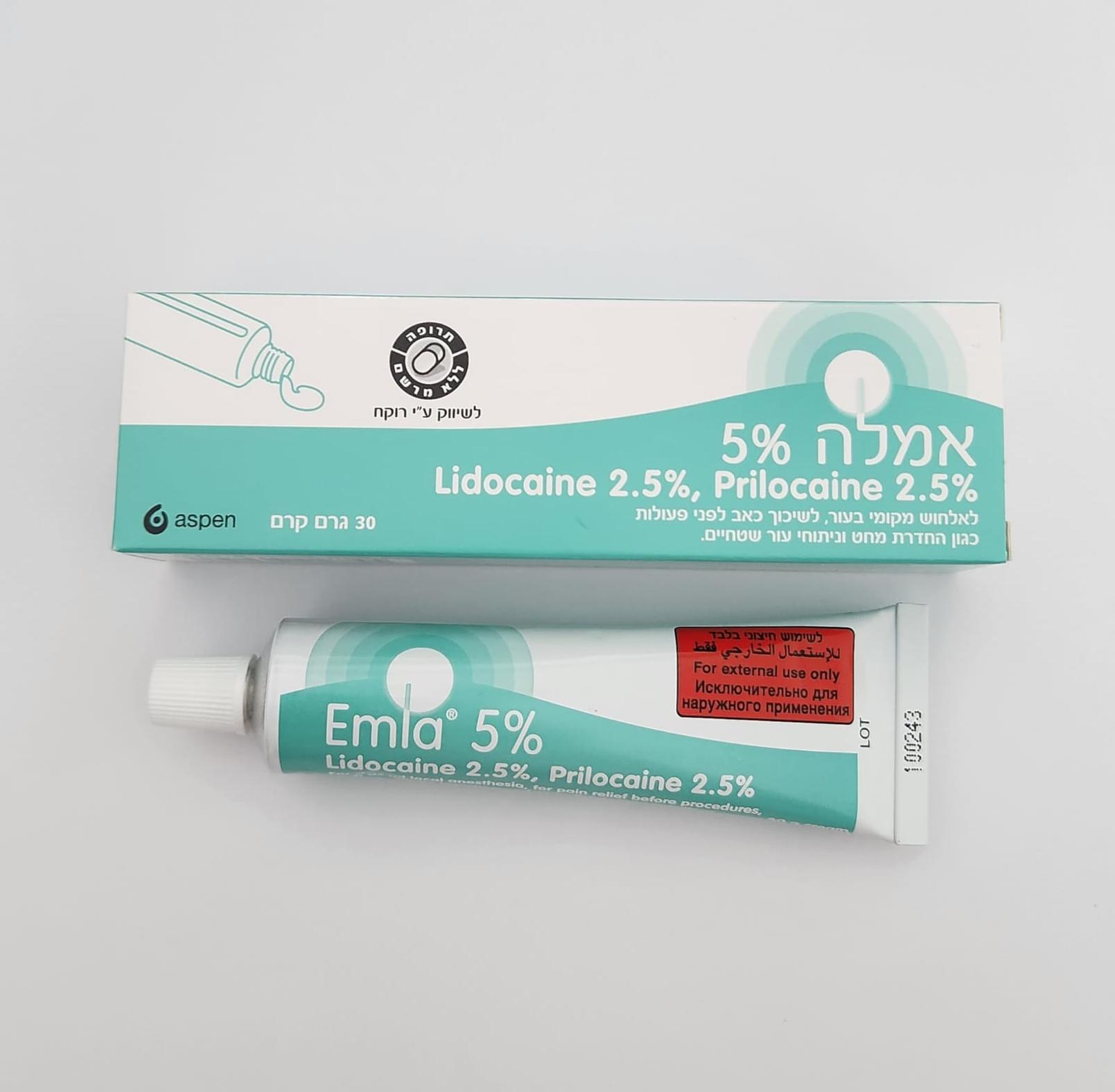Quest for the right Drug

אמלה % 5 EMLA 5% (LIDOCAINE, PRILOCAINE)
תרופה במרשם
תרופה בסל
נרקוטיקה
ציטוטוקסיקה
צורת מתן:
עורי : DERMAL
צורת מינון:
קרם : CREAM
עלון לרופא
מינוניםPosology התוויות
Indications תופעות לוואי
Adverse reactions התוויות נגד
Contraindications אינטראקציות
Interactions מינון יתר
Overdose הריון/הנקה
Pregnancy & Lactation אוכלוסיות מיוחדות
Special populations תכונות פרמקולוגיות
Pharmacological properties מידע רוקחי
Pharmaceutical particulars אזהרת שימוש
Special Warning עלון לרופא
Physicians Leaflet
Posology : מינונים
4.2 Posology and method of administration Surface/ Procedure Application Age Skin Apply a thick layer of cream on the skin and cover it with occlusive dressing. Adults Approx. 1.5 g/10 cm2 Minor procedures e.g. needle 2 g (approx. half a 5 g tube) for 1 insertion and surgical treatment of to 5 hours1) localised lesions. Dermal surgical procedures on Approx. 1.5-2 g/10 cm2 for 2 to 5 larger areas in a hospital setting hours1) e.g. split skin grafting. Dermal procedures on newly Maximum recommended dose: shaven skin of large body areas 60g. e.g. laser hair removal (self- Maximum recommended treated application by patient) area: 600 cm2 for a minimum of 1 hour, maximum 5 hours.1) Children Minor procedures, e.g. needle Approx. 1.0 g/10 cm2 for 1 hour insertion and surgical treatment of (see details below) localised lesions Neonates 0-3 Up to 1.0 g and 10 cm2 for one hour months3) 8) 2) Infants 3-12 Up to 2.0 g and 20 cm2 for 1-4 hours months3) 4) Children 1-6 Up to 10.0 g and 100 cm2 for 1-4 years hours1) Children 7- Up to 20.0 g and 200 cm2 for 1-4 12 years hours1) Children Prior to removal of mollusca. Application time: 30 minutes with atopic dermatitis Genital Surgical treatment of localised Approx. 5-10 g EMLA for 5-10 mucosa lesions, e.g. removal of genital minutes1). No occlusive dressing is Adults warts (condylomata accuminata) required. Commence the procedure and prior to injection of local immediately after removal of anaesthetics. cream. Prior to cervical curettage. Administer 10 g of cream in lateral vaginal fornices for 10 minutes. Skin of male Prior to injection of local Apply a thick layer of EMLA genital anaesthetics cream (1 g/10cm2) with occlusive organs dressing for 15 minutes Adults Skin of Prior to injection of local Apply a thick layer of EMLA cream female anaesthetics7) (1-2 g/10cm2) with occlusive genital dressing for 60 minutes organs Adults Leg ulcer Mechanical cleansing Apply a thick layer of the cream, Adults /debridement of leg ulcer(s). approx. 1-2 g/10 cm2 up to a total of 10 g to the leg ulcer(s).5, 6) Cover with an occlusive dressing. Application time: 30 to 60 minutes. Cleansing should start without delay after removal of the cream. 1) After a longer application time anaesthesia decreases. 2) Application for >1 hour has not been documented. 3) Until further clinical data are available, EMLA should not be used in infants up to 12 months of age receiving treatment with methaemoglobin-inducing agents. 4) No clinically significant increase in plasma methaemoglobin levels has been observed after an application time of up to 4 hours on 16 cm2. 5) EMLA has been used for the treatment of leg ulcers up to 15 times over a period of 1- 2 months without loss of efficacy or increased number or severity of adverse events. 6) Plasma levels have not been determined in patients treated with doses of >10 g, (See also Section 5.2). 7) On female genital skin, EMLA alone applied for 60 or 90 min does not provide sufficient anaesthesia for thermocautery or diathermy of genital warts. 8) Until further clinical data are available, EMLA should not be used at less than 37 weeks gestational age. One gram of EMLA cream pressed out of a tube of 30 g is approximately 3.5 cm. Persons frequently applying or removing cream should ensure that contact is avoided in order to prevent the development of hypersensitivity. Paediatric population Adolescents ≥ 12 years: As for adults (approximately 2 g EMLA applied under an occlusive dressing for a minimum of 60 minutes, maximum 5 hours). Term newborn infants, infants and children ≤ 11 years: In term newborn infants and infants < 3 months, only one single dose should be applied in any 24 hour period. For children aged 3 months and above, a maximum of 2 doses, separated by at least 12 hours can be given within any 24 hour period. If, based on clinical need, a decision is nevertheless taken to use two applications in children under the age of 3 months, see sections 4.4 and 4.8. The safety of EMLA in pre-term newborn infants has not been established. Use of EMLA is not recommended in pre-term infants. Use of EMLA is not recommended in infants less than 3 months of age receiving treatment with methaemoglobin-inducing drugs (see section 4.4). For all age groups analgesic efficacy may decline if the skin application time is more than 5 hours. Procedures on intact skin should begin soon after the occlusive dressing is removed. On the genital mucosa analgesic efficacy declines after 10-15 minutes and therefore the procedure should be commenced immediately. Methods of dose estimation If high levels of accuracy in dosing are required to prevent overdose (i.e. at doses approaching the maximum in neonates or if two applications may be required in a 24 h period), a syringe can be used where 1 ml = 1 g. A string of cream can be used to define the quantity of EMLA administered from the 30 g tube where 1 g = 3.5 cm; however, a string of cream may not be appropriate for all application needs, e.g. when administering a low dose to small surface areas.

שימוש לפי פנקס קופ''ח כללית 1994
לא צוין
תאריך הכללה מקורי בסל
01/01/1995
הגבלות
תרופה שאושרה לשימוש כללי בקופ'ח
מידע נוסף
